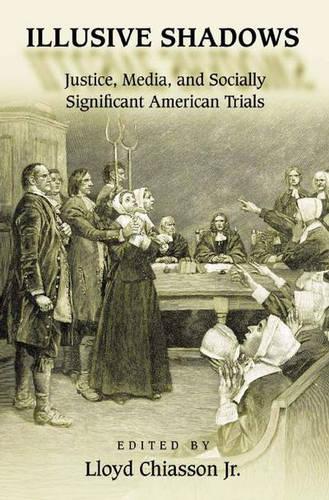
Illusive Shadows: Justice, Media, and Socially Significant American Trials
(Paperback)
Available Formats
Publishing Details
Illusive Shadows: Justice, Media, and Socially Significant American Trials
By (Author) Lloyd E. Chiasson
Bloomsbury Publishing PLC
Praeger Publishers Inc
30th November 2003
United States
Classifications
General
Non Fiction
Cultural studies
Legal systems: courts and procedures
345.7302
Physical Properties
Paperback
248
Width 156mm, Height 235mm
397g
Description
As Chiasson and his contributors illustrate, trials are media events that can have long-reaching significance. They can, and have, changed the way people think, how institutions function, and have shaped public opinions. While this collection on ten trials is about withcraft, slavery, religion, and radicalism, it is, in many ways, the story of America. Trials are the stuff of news. Those rare moments when justice, or a reasonable facsimile, is meted out. And what offers up more high drama, or melodrama, than a highly publicized trial Most news events enjoy short life spans. They happen; they are reported; they are quickly forgotten. As Chiasson and his contributors make clear, a trial often is a lingering, living thing that builds in tension. It is, every once in a long while, a modern Shakespearean drama with a twist: The audience becomes members of the cast because, every once in a long while, society finds itself the defendant. Trials can have lasting importance beyond how the public perceives them. A trial can have long-reaching significance if it changes the way people think, or how institutions function, or shapes public opinion. Ten such American trials covering a span of 307 years are covered here. In each, the sociological underpinnings of events often has greater significance than either the crime or the trial. The ten trials included are the Salem witch trials, the Amistad trial, the Sioux Indian Uprising trials, the Ed Johnson/Sheriff Shipp trial, the Big Bill Haywood trial, the Ossian Sweet trial, the Clay Shaw trial, the Manuel Noriega trial, and the Matthew Shepard trial. While the book is about ten crimes, the subsequent trials, and the media coverage of each, it is also a book about witchcraft, about religion, slavery, and radicalism. It paints portraits of a racist America, a capitalistic America, an anarchist America. It relates compelling tales of compassion, greed, stupidity, and hate beginning in 17th-century colonial times and ending in present-day America. In many ways, it is the story of America.
Reviews
[t]his book is a valuable addition to journalism historiography. The authors argue in each case that understandings are both elusive and illusive. It is to the jurors/readers that the job falls of deciding what each case truly means, what it says about who we are and who we have been at pivotal moments in our history. In that regard, the book is thought provoking and satisfying.-American Journalism
General readers and lower- and upper-division undergraduates.-Choice
"this book is a valuable addition to journalism historiography. The authors argue in each case that understandings are both elusive and illusive. It is to the jurors/readers that the job falls of deciding what each case truly means, what it says about who we are and who we have been at pivotal moments in our history. In that regard, the book is thought provoking and satisfying."-American Journalism
"General readers and lower- and upper-division undergraduates."-Choice
"[t]his book is a valuable addition to journalism historiography. The authors argue in each case that understandings are both elusive and illusive. It is to the jurors/readers that the job falls of deciding what each case truly means, what it says about who we are and who we have been at pivotal moments in our history. In that regard, the book is thought provoking and satisfying."-American Journalism
Author Bio
LLOYD CHIASSON JR. is Professor, Department of Mass Communication, Nicholls State University. Among his earlier publications are The Press in Times of Crisis (Greenwood Press, 1995) and The Press on Trial (Greenwood Press, 1997).
